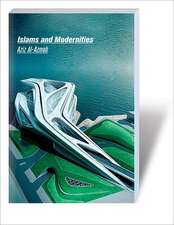Striking from the Margins
Editat de Aziz Al-Azmeh, Nadia Al-Bagdadi, Harith Hasan, Harout Akdedianen Limba Engleză Paperback – 7 sep 2021
In Striking from the Margins, leading authorities in their field propose new analytical frameworks to facilitate greater understanding of the fragmentation and devolution of the state in the Arab world. Challenging the revival of well-worn theories in cultural and post-colonial studies, they provide novel contributions on issues ranging from military formations, political violence in urban and rural settings, transregional war economies, the crystallisation of sect based authorities and the restructuring of tribal networks.
Preț: 228.51 lei
Nou
Puncte Express: 343
Preț estimativ în valută:
43.74€ • 47.53$ • 36.76£
43.74€ • 47.53$ • 36.76£
Carte disponibilă
Livrare economică 31 martie-14 aprilie
Preluare comenzi: 021 569.72.76
Specificații
ISBN-13: 9780863561399
ISBN-10: 086356139X
Pagini: 480
Dimensiuni: 152 x 230 x 28 mm
Greutate: 0.54 kg
Editura: SAQI BOOKS
ISBN-10: 086356139X
Pagini: 480
Dimensiuni: 152 x 230 x 28 mm
Greutate: 0.54 kg
Editura: SAQI BOOKS
Cuprins
Table of Contents
Comparative Perspectives
1. Deniz Kandiyoti: From the Margins to The Centre? How Gender Politics Became A Litmus Test of Governance. 2. Stathis Kalyvas: Arab Civil Wars: An Assessment.
Part I: States, Political Economies and Systematic Collapse
1. Mudher Al-Alwani: Iraqi Market and Ethnic-Sectarian Bioregionalism. 2. Isam Al-Khafaji: Reconfiguring the State, Restructuring Communities. 3. Virginie Collombier: Post-Qaddafi Libya: Political Agreements or A New Social Contract? 4. Adam Hanieh: State Formation In The Middle East: The GCC and the Political Economy of the Regional Scale. 5. Shamel Azmeh: The Political Economy of Syria and Iraq.
Part II: The Devolution of Violence: Militias, Security and War Economies
1. Omar Ashour: The (Military) Rise of Armed Non-State Actors: The Case of Isis. 2. Hosham Dawood: Tribes and Violence in Armed Conflict: An Anthropologist's View. 3. Frederic Wehrey: Hybridised Security Governance: The Case of Libya.
Part III: Reconfigurations of Religion: From the Margins to the Centre
1. Harout Akdedian: The Reconfiguration of the Religious Field in Syria: From Neoliberalism to State Atrophy and Beyond. 2. Harith Hasan: Religious Actors, Political (Dis)Order and the Reconfiguration of Margincenter Relations In Iraq: The Case of the Shii Clerical Authority. 3: Haider Saeed, The Sect and the Nation.
Part IV: Localities
1. Asya El-Meehy: Governance from Below: Comparing Local Experiments in Egypt and Syria After the Uprisings. 2. Asma Jameel: Families of Daesh: Retribution and Forgiveness.
Part V: Jihadism and Local Networks
1. Hamzeh Al-Mustafa: Virtual Networks During the Syrian Revolution 2. Haenni, Patrick: The Reorganization and Securitization of Daesh Strongholds 3. Mazur, Kevin, Dayr Al-Zur: From Revolution to Isis: Local Networks, Hybrid Identities and Outside Authorities.
Part VI: State Disaggregation and Geopolitics
1. Arjomand, Said: Daesh and Iran's Islamic Revolution in Historical Perspective. 2. Kodmani, Bassma: The Future of the Syrian State. 3. Saunders, Robert A.: Extending the Katechon: Religio-Civilizational Vectors in Russia's Intervention in the Levant.
Comparative Perspectives
1. Deniz Kandiyoti: From the Margins to The Centre? How Gender Politics Became A Litmus Test of Governance. 2. Stathis Kalyvas: Arab Civil Wars: An Assessment.
Part I: States, Political Economies and Systematic Collapse
1. Mudher Al-Alwani: Iraqi Market and Ethnic-Sectarian Bioregionalism. 2. Isam Al-Khafaji: Reconfiguring the State, Restructuring Communities. 3. Virginie Collombier: Post-Qaddafi Libya: Political Agreements or A New Social Contract? 4. Adam Hanieh: State Formation In The Middle East: The GCC and the Political Economy of the Regional Scale. 5. Shamel Azmeh: The Political Economy of Syria and Iraq.
Part II: The Devolution of Violence: Militias, Security and War Economies
1. Omar Ashour: The (Military) Rise of Armed Non-State Actors: The Case of Isis. 2. Hosham Dawood: Tribes and Violence in Armed Conflict: An Anthropologist's View. 3. Frederic Wehrey: Hybridised Security Governance: The Case of Libya.
Part III: Reconfigurations of Religion: From the Margins to the Centre
1. Harout Akdedian: The Reconfiguration of the Religious Field in Syria: From Neoliberalism to State Atrophy and Beyond. 2. Harith Hasan: Religious Actors, Political (Dis)Order and the Reconfiguration of Margincenter Relations In Iraq: The Case of the Shii Clerical Authority. 3: Haider Saeed, The Sect and the Nation.
Part IV: Localities
1. Asya El-Meehy: Governance from Below: Comparing Local Experiments in Egypt and Syria After the Uprisings. 2. Asma Jameel: Families of Daesh: Retribution and Forgiveness.
Part V: Jihadism and Local Networks
1. Hamzeh Al-Mustafa: Virtual Networks During the Syrian Revolution 2. Haenni, Patrick: The Reorganization and Securitization of Daesh Strongholds 3. Mazur, Kevin, Dayr Al-Zur: From Revolution to Isis: Local Networks, Hybrid Identities and Outside Authorities.
Part VI: State Disaggregation and Geopolitics
1. Arjomand, Said: Daesh and Iran's Islamic Revolution in Historical Perspective. 2. Kodmani, Bassma: The Future of the Syrian State. 3. Saunders, Robert A.: Extending the Katechon: Religio-Civilizational Vectors in Russia's Intervention in the Levant.










